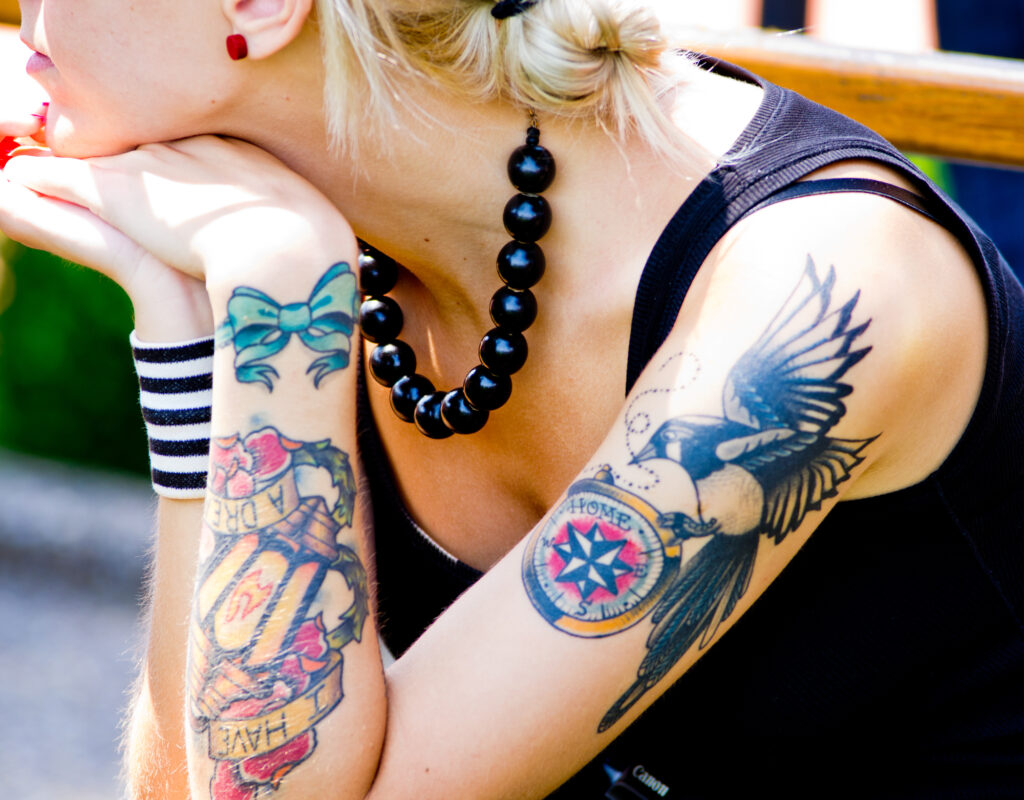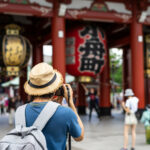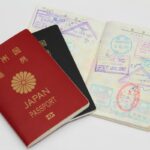Planning a trip to Japan, but worried about how your tattoos will be viewed by the locals? Japan has a famously complicated history with tattoos.
While the country is filled with forward-thinking, accepting and friendly people, negative views regarding tattoos still linger. The increase in tourism over the past few decades has somewhat loosened these views on tattoos, but there’s still a stigma that surrounds this form of body art. In some situations, people with visible tattoos are even denied access to some public areas and private businesses alike.
Here’s what tattooed people need to know before visiting Japan, to ensure they maintain cultural etiquette and avoid any tense or complicated situations involving body art.

Tattoos have a complicated history in Japan
Japan is well-known for its long, struggled history with tattoos. While Japanese tattoo artists of the past and modern times have brought us the traditional Japanese style of tattoos the world loves, body art is generally frowned upon in Japan. How did it get to this point?
Tattooing in Japan began with tribal tattoos, followed by criminals and the yakuza, up until the modern generation. Here’s a brief history.
The Jomon Period
During the Jomon Period (roughly 10,000 B.C.-300 B.C.), people began inking their bodies with tribal tattoos, or irezumi. This tattooing method was performed by hand using wooden handles with metal needles. Artists applied ink in a pattern of dots, lines and circles, reminiscent of pottery designs of the time. The Jomon people avidly embraced body modification, not just tattoos. Even dental modification and piercing were popular forms of self-expression.
The Edo Period
Tattoos became even more widespread during the Edo Period (1603-1868). During this time, tattoos became a symbolic identifier of a person’s position in society, especially in Edo (modern-day Tokyo) and Osaka. Criminals would get face tattoos as punishment, both in terms of physical pain and public shame. Soon, arm tattoos became a punishment as tattoos had more of a reputation in criminal circles. All this led to the storied relationship between tattoos and the yakuza, a complicated issue that remains today.
Yakuza played a big role in the criminal circles of the Edo Period. In simplest terms, yakuza were groups of criminals that ran illegal businesses like gambling, extortion and prostitution. If someone wished to join a group of yakuza, they had to endure a ritual of getting a tattoo to display their high level of pain tolerance. The style and method of tattooing used by yakuza groups is much more painful than today’s modern methods, so getting a tattoo showed a person’s personality, courage and emotional stability.
Due to its association with criminality, tattooing became illegal during the Edo period. The Japanese people increasingly saw tattoos as a reflection of the life of an outcast or lawbreaker. Yakuza used this to bolster their reputation, and they started to expand on their tattoos to full body suits that symbolized their rank. A full “irezumi” body suit tattoo was expensive and painful—visual evidence of the member’s dedication to their group.
The Meiji Period
A ban on tattoos occurred throughout the Meiji Era (1868-1912) up until the end of World War II. As the world opened up and tourists came to Japan, the Japanese people wanted to look sophisticated and cultured, and the complicated history of tattoos led to its prohibition in public. Even today, many laws exist regarding tattoos in Japan. While tattoos aren’t illegal, exposed ink is frowned upon by the Japanese public. The tattoo industry itself is heavily regulated, and artists even need to hold a medical certificate to practice their craft.
Modern day
Throughout the years—especially in recent decades—there’s been a gradual shift in the view of tattoos in Japan. As the country becomes more and more influenced by the West, and as tourists flock to the nation to experience its unique culture and heritage, there’s been a change in perspective for the better. Younger generations are helping things loosen up in terms of body art—they may even appreciate your ink, but don’t take it personally if an elderly local gives you a stare.
Exposed tattoos are rare among Japanese citizens
Although there’s a stigma surrounding tattoos in Japan, there’s no shortage of locals—and not just yakuza—with body art. While younger generations are quietly rebelling against these old social norms, the change won’t happen overnight. It will take a while before body art enjoys mainstream acceptance in Japan.
While it’s not a surprise to spot locals with tattoos in Japan, it is rare. Japanese people with ink often keep it entirely covered for social reasons, and especially in terms of maintaining employment. There’s a set of rules to follow—whether you’re a Japanese local or a tourist—so keep that in mind as you enjoy your stay in the country.
Tattoos are generally acceptable on travelers…
While locals understand and generally follow social norms regarding tattoos, the rules are slightly looser for travelers. The Japanese people understand that tattoos are more popular in foreign countries, and while you might get glances and side-eyes from the locals, they aren’t looks of disapproval or disgust. They’re more like looks of curiosity, which isn’t necessarily a bad thing. You may even get a compliment or two during your travels!
…but off-limits in some places
Even though tattoos are legal in Japan, tourists and locals alike who have body art face a variety of issues. In some cases, people with tattoos are even banned from entering public places like bathhouses (onsen), beaches, gyms, hot springs and pools.
Unfortunately, many traditional Japanese inns (ryokans) ban tattoos entirely. In fact, a recent survey of nearly 3,800 ryokan in Japan showed that more than half of business-owners refuse guests with tattoos. While the Japanese Tourism Agency is encouraging ryokan-owners to adopt more lenient views regarding tattoos, the stigma still remains. If you don’t want to show up to your ryokan only to get turned away due to your ink, ask about their policy beforehand, and always keep your tattoos covered (to find out more about Ryokan and how they differ from Onsen, read here). Even ryokan-owners who are aware of your body art want you to keep it covered when you’re in common areas of the inn.
If possible, covering visible tattoos is recommended. In the recent past, it was easier for business-owners to turn tattooed people away, whether locals or tourists. Now, as the Japanese view of tattoos is loosening, it’s becoming harder for business-owners to deny service to tattooed people without receiving public backlash. During your stay in Japan, keep Japanese business etiquette norms in mind, so you know what to expect if you’re faced with a business that won’t accept tattoos.
Tips for tattooed travelers
Although tattoos aren’t illegal in Japan, they can keep travelers from getting the full, authentic Japanese experience. Tourists with tattoos should prepare for their trip by keeping the following tips in mind:
- Be prepared. Traveling to any country with a language barrier can be complicated, especially in a place like Japan that puts such a high priority on etiquette. Before you visit Japan, make sure you understand the signs that indicate people with tattoos are or aren’t allowed, and keep a lookout for them during your travels. Also, always keep your tattoos covered at temples or sacred sites. While they generally don’t post signs designating the area as a tattoo-free zone, it’s implied, and your show of respect is much appreciated.
- Be mindful on public transportation. While riding Japan’s trains is often an informal, everyday experience, you still need to practice proper etiquette. When using public transportation during your journey to Japan, cover your tattoos, since your ink might be offensive to the locals.
- Cover tattoos when possible. During your stay in Japan, keeping your tattoos covered whenever possible is simply good etiquette. There are several ways to make your tattoos more discreet. Wear clothing or jewelry that covers the ink, or you can even use bandages or a rash guard to hide them. In some cases, makeup can hide tattoos.
- Discuss tattoos prior to your stay. Visitors who plan to stay with a host family or an Airbnb should discuss their tattoos with their hosts prior to arrival in Japan. Some good communication goes along way, to ensure you won’t disrespect your hosts as you enjoy your stay in their home.
- Book a private onsen. Relaxing in an onsen, or Japanese hot spring, is a one-of-a-kind experience that everyone visiting Japan should do at least once (for more advice on private onsen, read here). Public onsen often ban tattoos entirely, so tattooed travelers should book a private onsen. You’ll be able to enjoy the soothing experience of a Japanese hot spring in peace and quiet, all without worrying about offending other guests.
Be mindful of tradition when traveling with ink
Regardless of your views on tattoos, remember that Japanese people take their etiquette seriously. During your stay in the country, be sensitive about how your body art can impact the locals. After all, you’re on their turf, and you should abide by their norms and rules.
The Japanese people are well-known for their polite, friendly nature—don’t make them tell you to cover up or leave. Pay attention to tattoo rules during your journey to Japan and enjoy a pleasant experience, even if you’re sporting a little ink.
- How Much Money Can You Make Teaching English in Japan? - December 12, 2022
- The Best Places to Teach English in Japan - December 9, 2022
- The Best Credentials for Teaching English in Japan - December 8, 2022








